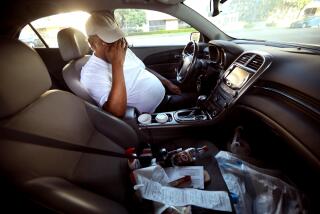Auto Dealer Drives Effort to Donate Cars to the Needy
- Share via
SANFORD, Fla. — Dorothy “Dot” Frost burst into tears and jumped up and down when she saw the 11-year-old gold Ford Tempo parked on the dusty lot of Charity Cars.
“At last! Thank you, Jesus. I am too happy,” she said.
For Frost, who has a temporary job after spending a decade on welfare, being given a free car may be a ticket to a better life, to finding permanent employment.
“You feel like Santa Claus giving these cars away,” said Brian Menzies, a used-car dealer who has given away 26 cars, including Frost’s vehicle, since opening Charity Cars in November.
Florida officials hope to find more private benefactors like Menzies to help them move 141,000 welfare recipients off the dole and into jobs.
Social workers say transportation is the biggest obstacle to training welfare recipients and finding them work. Many jobs are in the suburbs, while welfare recipients are concentrated in urban areas. And many of them must work nights or weekends, when public transportation is limited.
“You can teach a person to fish and feed him a lifetime, but if you can’t get to the river, you’re not going to fish at all,” said Phyllis Busansky, executive director of the WAGES State Board, the body overseeing welfare reform in Florida. The acronym stands for the ungainly phrase Work And Gain Economic Self-sufficiency.
Nationally, only 6% of welfare recipients own cars, although the figure is somewhat higher in Florida.
Menzies operates his car-giveaway program on his own, with no public money. Most of the cars he receives have been donated, and he spends about $1,000 on each vehicle for repairs, license plates, down payments for the recipient’s insurance and six months of free service.
People getting off welfare are referred to Charity Cars by state social workers, although anyone can apply for a car.
Each car carries a three-year lien, giving Charity Cars the power to monitor the recipients and prevent them from selling the vehicle for cash. Any recipient going back on welfare within three years has 30 days to find another job or the car is repossessed.
The vehicle also can be repossessed for a drunken driving conviction, loss of a driver’s license, failure to maintain the car, or a participant’s refusal to participate in follow-up case studies. Twenty-four of the 26 people who have received cars are still in the program.
Menzies said Charity Cars could use the support of the auto industry. “We could give away thousands of cars,” he said.
A report for the Florida Senate said the state should encourage Menzies and others to donate cars to welfare-reform participants.
“That’s something that I believe will catch the imagination of people out in the state who want to help their neighbors,” said Sen. James Hargrett, chairman of the Senate Transportation Committee.
But Menzies is having trouble landing a $257,000 state grant. The WAGES board is waiting for lawyers to decide whether the state could be held responsible for accidents involving the cars.
Menzies, 43, has taken a leave of absence from his used-car dealership, where he earned a six-figure income, to devote himself full-time to Charity Cars.
He knows firsthand what it’s like to be on hard times. He was homeless in the 1980s after a divorce, drinking and stealing food, until someone he knew gave him a job at a car dealership.
Frost has been off welfare for a year and a half and has a transitional job with the state Labor Department. She is rearing four grandchildren and needs a car to get groceries and take the kids to doctor appointments.
Social worker Sue Bouillon said Menzies’ program also could help Frost find a job in public relations or customer service, her desired field.
“His program is what welfare reform is about,” said Bouillon. “We thought this was one of the best things since chocolate cake.”
More to Read
Sign up for Essential California
The most important California stories and recommendations in your inbox every morning.
You may occasionally receive promotional content from the Los Angeles Times.











